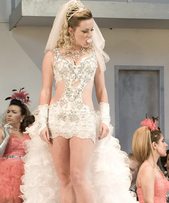SITE GUIDE
SEARCH
REVIEWS
REVIEW ARCHIVES
ADVERTISING AT CURTAINUP
FEATURES
NEWS
Etcetera and
Short Term Listings
LISTINGS
Broadway
Off-Broadway
NYC Restaurants
BOOKS and CDs
OTHER PLACES
Berkshires
London
California
New Jersey
DC
Connecticut
Philadelphia
Elsewhere
QUOTES
TKTS
PLAYWRIGHTS' ALBUMS
LETTERS TO EDITOR
FILM
LINKS
MISCELLANEOUS
Free Updates
Masthead
Writing for Us
A CurtainUp  London Review
London Review
 London Review
London ReviewDon Giovanni
|
He has already betrayed me and he will betray you too.
— Elvira
|

Cast members in Zerlina’s wedding scene (Photo: Mike Hoban) |
In the first scene, Anna (Natasha Jouhl) is not raped but is playing a sexual S and M game with Giovanni (Grant Doyle) where he is the one that is tied up and blindfolded. As her father, the Commendatore (Christophoros Stamboglis) comes downstairs to investigate, Anna releases Giovanni and as they fight, he defends himself with a table knife. Giovanni and Leporello (Joshua Bloom) flee. The paramedics arrive and take the Commendatore to hospital. There can be no doubt that Anna knows who the man is, that she later claims attacked her, to her fiancé, the geeky Ottavio (Jesús León). This is the major deviation from the original plot, and as we meet them all three women, Anna, Elvira and Zerlina are not the innocent victims of the libertine.
We first meet the weeping Elvira (Sophie Bevan) making her way through a whole box of paper handkerchiefs before Leporello’s masterly rendition of “The Catalogue” of Giovanni’s female conquests are printed off on a roll of computer paper, until it is 50 feet long and still printing. Elvira here is as much a figure of fun, of self inflicted misery, passive aggressive, as victim which of course puts a different slant on the plot. When Giovanni sees Zerlina (Mary Bevan) she is in full Essex wedding outfit, a spangly cut out micro dress with a layered tulle train like a chorus girl and with go go dancing bridesmaids in mango tulle for her wedding to Masetto (Callum Thorpe). Elvira and Giovanni struggle over Zerlina, Elvia holding Zerlina’s arms while Giovanni holds her legs in a comic scene.
The disadvantage of director’s Daniel Slater’s original approach is that it make us question Anna’s distress as mere acting as we realise that much of what she relates is a lie. It is as if we are looking at Lady Macbeth here rather than Donna Anna. But we start to sympathise when Masetto says, “It is we men who are the weaker sex.” All of the women seem knowing or complicit.
The opera takes place in a multilevel apartment block set with designer chrome and white leather minimalist furniture with Giovanni as some kind of property developer and Leporello as his chauffeur. But this auditorium is wonderfully involving and intimate after the vast opera houses and although there are plot twists, Slater’s direction has a clarity of vision even if some of the motivation raises questions and the libretto may not always reflect the director’s design. We know what has happened; it is the why we want to debate.
I was impressed with Sophie Bevan’s singing as Elvira, angry enough to be believably unhinged and I loved Joshua Bloom’s finely sung and wily Leporello. Grant Doyle as Giovanni has a school boyish charm like a television presenter, with his hair flopping forward over his face and we can see, that together with his wealth, he will attract women. The ending is a personal, original if less spectacular version of Hell, with Anna choosing to join Giovanni over Ottavio.
After an hour and a half for a dinner or picnic interval in white tents in the grounds ass dusk falls, the stage lighting came into play. It lit the white furniture ochre before the audience leaves to torchlight and candles on the path. The Garsington Opera Orchestra conducted by Douglas Boyd is just splendid, delivering Mozart’s wonderful tunes brilliantly and the whole evening is very special indeed.
|
Subscribe to our FREE email updates with a note from editor Elyse Sommer about additions to the website -- with main page hot links to the latest features posted at our numerous locations. To subscribe,
E-mail: esommer@curtainup.comesommer@curtainup.com
put SUBSCRIBE CURTAINUP EMAIL UPDATE in the subject line and your full name and email address in the body of the message -- if you can spare a minute, tell us how you came to CurtainUp and from what part of the country. |
| Don Giovanni
Music: Wolfgang Amadeus Mozart Libretto: Lorenzo da Ponte English translation by Ellen H Bleiler Directed by Daniel Slater Conductor: Douglas Boyd Starring: Grant Doyle, Joshua Bloom, Natasha Jouhl, Christophoros Stamboglis, Jesús León, Sophie Bevan, Mary Bevan, Callum Thorpe Design: Leslie Travers Lighting: Bruno Poet Choreographer: Ran Arthur Braun Running time: Fours hours 25 minutes with a 95 minute dinner interval Box Office: 01865 361636 Website: www.garsingtonopera.org Jeffries are supporting the 2012 Garsington Opera Season Booking to 2nd July 2012 Reviewed by Lizzie Loveridge based on 4th June 2012 performance at the Wormsley Park Estate, Wormsley, Near Stokenchurch, Buckinghamshire HP14 3YG (Rail: High Wycombe plus bespoke minibus) |
|
REVIEW FEEDBACK Highlight one of the responses below and click "copy" or"CTRL+C"
Paste the highlighted text into the subject line (CTRL+ V): Feel free to add detailed comments in the body of the email . . . also the names and emails of any friends to whom you'd like us to forward a copy of this review. |




